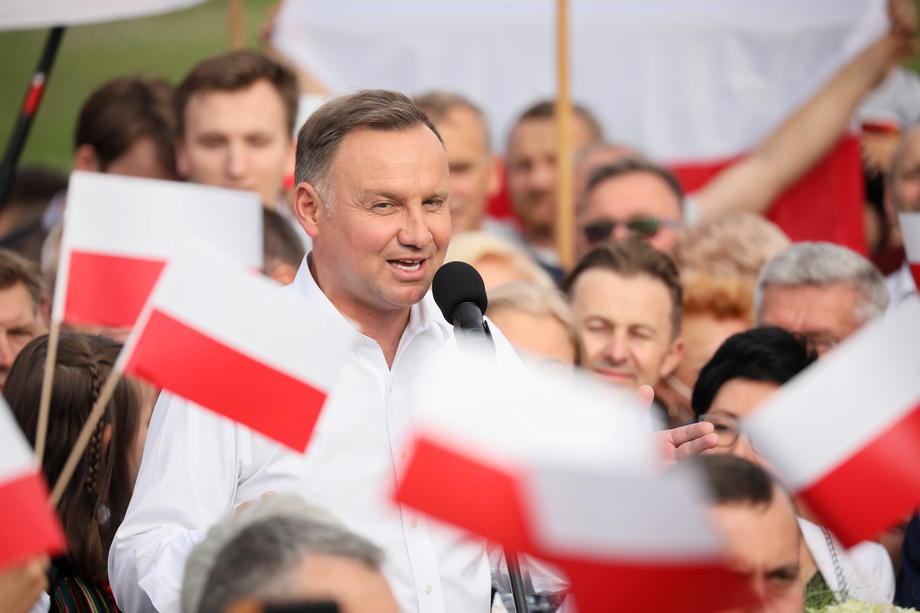The subject of new rules on private media ownership has returned to the political agenda in Poland, rekindling concerns in the country and abroad that the ruling Law and Justice (PiS) party, which took control of the public television and radio broadcaster shortly after winning the elections in 2015, is trying to control privately-owned outlets by challenging their ownership.
In the context of the coronavirus pandemic, this threatens to create an additional source of pressure on the private media in Poland as this time of economic uncertainty.
Poland has a diverse private media landscape that spans the political spectrum, from newspapers to TV channels. This includes outlets owned by foreign media groups, often German ones. Influential outlets owned by foreign groups include tabloid-style daily Fakt and Polish liberal weekly Newsweek, which are published by Swiss-German Ringier Axel Springer Polska, and private broadcaster TVN, which is owned by TVN Group, a subsidiary of American multinational mass media company Discovery Inc.
Foreign ownership is not limited to nationwide outlets; Polska Press, currently owned by the German company Verlagsgruppe Passau, publishes 20 regional dailies in Poland.
Some politicians in the PiS-led ruling camp have claimed that foreign-owned media outlets are deliberately critical of the current government and called for stricter rules on ownership.
Politicians in or allied with PiS have used two terms in relation to the private media – foreign or domestically-owned. The first, “repolonization”, refers to imposing a limit on the level of foreign capital in Polish media companies (PiS politicians have also used this term in relation to banks).
The second, “deconcentration”, refers to limiting the number of outlets that a single media group can own, effectively breaking up larger groups. A possible target could be Polish media company Agora, the publisher of the liberal Gazeta Wyborcza daily, which is strongly critical of the government. Agora also owns a photographic agency (Agencja Gazeta), radio stations and a publishing house, among other outlets.
Talk in PiS of “repolonization” or “deconcentration” long precedes the coronavirus pandemic, but the subject receded from the agenda as the party focused on winning a series of elections between 2018 and 2020, which ended with the presidential election this summer. However, it reemerged during that election campaign, after President Andrzej Duda, the PiS-allied candidate, who was re-elected for a second term in July, accused Fakt of meddling in the election after it reported on a pardon that he granted to a man who had served his sentence in a paedophilia case.
“Does Axel Springer, a company of German descent that owns the Fakt newspaper, want to influence the Polish presidential election?” Duda said during a campaign rally in the western town of Boleslawiec on July 3rd. “Do the Germans want to choose the president in Poland?” he added.
The subject was picked up by PiS’s chairman, Jarosław Kaczyński, who is widely seen as the country’s informal leader. In his first interview after the election, published on July 14, he told the Polish Press Agency that “media in Poland should be Polish”.
“We won despite an extremely tough campaign, one in which all the rules were often broken. The assault on us was coordinated by a powerful media front, also inspired from the outside,” he said, referring to the presidential election.
Although formal plans have not been announced, there have been indications that the party could push ahead with “repolonization” as part of a government legislative offensive this autumn, after a long-awaited cabinet reshuffle revealed on September 30. Officials have indicated that the reforms would limit the proportion of foreign ownership in media companies and be modeled on existing legislation in France and Germany.
Despite the lack of details, the recent remarks by Kaczyński and other politicians in the governing camp have already raised concerns in Poland and abroad.
“Pluralism in the Polish media already exists. Forced fragmentation of the media will limit freedom of speech because only State-owned and small outlets will survive. Polish society would not benefit from having fewer diverse voices,” U.S. Ambassador to Poland Georgette Mosbacher wrote on Twitter on 28 August.
“Forcing media companies to sell shares will force investors to look elsewhere. That’s not a good investment climate – it’s censorship. Attracting foreign investment and a strong economy requires predictability,” she added in a second tweet that day.




